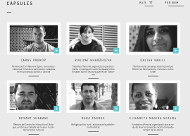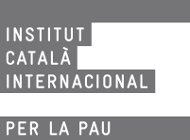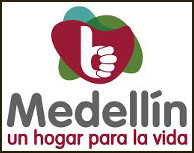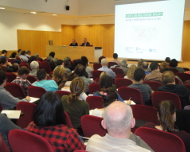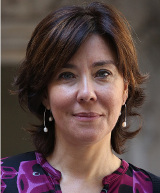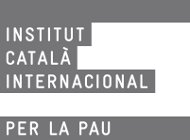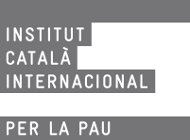The deadline to submit nominations for the ICIP Peace in Progress Award was June 30th. This prize aims to publicly recognize individuals, entities or institutions that, in an outstanding and extensive manner, have worked and contributed to the promotion and building of peace.
The ICIP Peace in Progress Award is granted by agreement of the Governing Board of ICIP and consists of public recognition, a sculpture created by the Nobel Peace Prize winner, artist and activist Adolfo Pérez Esquivel, called Porta del Sol, and a financial prize of 4,000 euros. The award is presented at an institutional award ceremony which takes place annually at the Catalan Parliament.
The award is granted by the ICIP Governor’s Board, which will now evaluate all the proposals submitted. The winner will be announced in September, coinciding with the celebrations of the International Day of Peace.
Previously granted
The ICIP Peace in Progress Award originated in 2011, with an extraordinary edition of the award honoring the Parliament of Catalonia for representing the continuity and legacy of the institutions “Pau i Treva” and “Consolat de Mar.” That same year, the first regular edition of the award recognized the struggle of conscientious objectors and “insubmisos” (people who refuse to do military service or any substitute social work) represented by Pepe Beunza, the first conscientious objector to compulsory military service for ideological reasons in Spain.
Then, in 2012, the ICIP Award was granted to five Madres de Soacha (Mothers of Soacha) for their work in favor of peace and human rights in Colombia. With this award, ICIP wanted to recognize their courage and perseverance in pursuit of truth, justice, and reparations for the killings of their children by the State security forces, and other cases of extrajudicial executions known as false positives.
In 2013, the ICIP Peace in Progress Award was granted to the ex-general born in Belgrade, Jovan Divjak, for his courage in the defense of Sarajevo during the Balkans War and his work in favor of the victims of that conflict.
Last edition of the award, in 2014, honored the Women’s International League for Peace and Freedom (WILPF) for its century-long involvement in the work of women for peace, as well as its commitment to disarmament, the defense of human rights and the persistence to obtain the recognition of the role of women in the building of peace.
Author: whads
New Peace Capsules
The perception of peace varies greatly depending on the historical moment, the sociopolitical context, culture, religion and life experience. The Peace Capsules project is a co-production of the International Catalan Institute for Peace (ICIP) and the Contrast Collective, in collaboration with Digital Dosis, which aims to show this diversity of visions and expectations that are projected on the word “peace”.
People from around the world respond to the question What is peace to you? in relation to their experience living in countries in conflict or with their commitment against war and to building peace.
Each one of these reflections, edited in video with subtitles in Catalan, Spanish and English, are called capsules, and they are compiled on the website www.capsulesdepau.com. The different capsules are sorted by name, date and country of origin. Among those who participated in the project and explained their vision of peace, we find peace researchers, activists and people who have directly experienced conflict.
12 new capsules
The project first saw the light of day in September 2014, with the publication of 52 capsules and various educational materials to work on peace culture in schools. Now, a year later and coinciding with the International Day of Peace (September 21), ICIP has published twelve new capsules of activists from around the world. Committed people and people working for peace from Chechnya, Israel, Palestine, Kurdistan, Japan, Guatemala, Costa Rica or the Democratic Republic of the Congo reflect on what living in peace means to them.
With the publication of these twelve new capsules, the website has a total of 64 videos with the reflections of people from 32 different countries.
The diversity of the roles of the protagonists and their origin allows for the building of a global vision of peace. Peace as a synonym of social justice, equal opportunities, the absence of direct and indirect violence, the struggle for the recognition of human rights, but also peace understood as harmony, as inner peace.
Declaration on the occasion of the International Day of Peace
For decades, the United Nations has highlighted certain days of the year to draw attention to world problems and to bring us closer to a solution. On September 21, the emphasis is on peace. This year, on its 70th anniversary, the United Nations has chosen as its theme “Partnerships for Peace – Dignity for All.” The UN Secretary-General has recalled that to build peace, the collaboration of everyone is needed: individuals, companies, governments and associations, because of the significant role they play in fostering social progress, protecting the environment and creating a more just, stable and peaceful world. And, as the UN message goes on to state, this year’s International Day of Peace comes at a moment of peril, but also of great promise, given the significance of the adoption of the new Global Goals for Sustainable Development for 2030. They will replace the Millennium Development Goals, which were bittersweet: they have resulted in substantial improvements although they have not been achieved completely around the world. So this is an interesting and suggestive moment, since the new goals explicitly incorporate objectives and milestones related to peace.
Nevertheless, this year our declaration is more combative, with a forceful title that is normative and not merely descriptive. A title that in itself intends to be a call to action: There will be no peace without coherence between words and deeds! Coherence is a recurring theme in the collective action for peace, as in the famous quote: “There is no road to peace; peace is the road”: the ends and the means must be coherent in the struggle for peace and justice. Or, as is said when talking about education for peace, coherence must be found between words and deeds because, otherwise, if words and deeds are not coherent, the hidden curriculum – the one educators and educational institutions transmit with their real procedural endeavor – ends up canceling out and wasting the transformational power of the explicit curriculum, of what is said will be done.
And this is the harrowing problem facing us on September 21: the hidden curriculum prevails over the explicit curriculum; the facts deny the words. The facts categorically show the inanity of many words. Incoherence is the norm.
Everyone surely knows what we are referring to: the humanitarian and migratory crisis resulting from the hundreds of thousands of refugees that arrive in Europe, particularly by crossing the Mediterranean, in search of asylum, of refuge. They demand the application of the Convention of 1951 and, especially, the fulfillment of the words and former actions that speak of the EU as a territory of peace, wellbeing, prosperity, the defense of human rights, of shelter and hope; a territory that promotes the free circulation of people, ideas, goods… But the actions insist on saying something else: there is no common asylum policy; many EU countries opt for the fad of building walls, refusing entry and moving people to other locations, modifying their own legislation in order to give this immorality an appearance of legitimacy. They even use tear gas against refugees coming from Africa and the Middle East.
More than half a million people have come to our shores in the course of the year. This certainly represents a management challenge, but it is also true that most of them have been received in a way that is inconsistent with the words and ideals that, after World War II, advised finding a mechanism to end the scourge of war, and led to the creation of the European communities.
And all of this is happening at a moment when we are preparing to call for the creation of synergies and alliances for peace and development to provide ourselves with a new program for 2030. At a moment when, according to recent data issued by the United Nations High Commissioner for Refugees, the world has more than 60 million refugees and displaced persons, a figure that could only be compared, in relative terms, to the number at the end of World War II. Or, in “personalized” numbers, at a time when one in every 122 people in the world is a refugee, an internally displaced person or an asylum seeker. Or when, four years after the breakout of the internal war in Syria, there are currently more internally displaced Syrians and refugees living outside the country than there are Syrian citizens who remain at home.
In this context, we must face, in terms of coherence, two contradictory pieces of news. One that is hopeful, and that fills us with joy and hope for the future: the active and direct solidarity of citizens, of many cities and their authorities, of many non-central government authorities, such as those of Catalonia and Barcelona, who have mobilized and prepared to take in people. And another one that is bad: the shameful spectacle of EU institutions, unable even to decide on how to distribute 120,000 people among member states, a figure that is far from what the UN had requested and farther still from what is needed. In addition, the institutions are not even seriously considering dealing with the structural causes of the movement of refugees or facing the second wave of the crisis; about two million refugees will have to be managed in the continent over the next few years, given the present number and the number resulting from the application of the right to reunification, which could multiply the current numbers by two or three.
And here is where, as EU citizens, our prestige is at stake. Where the hidden curriculum is destroying the example of a Union which was awarded a Nobel Prize for its contribution to peace and human rights. What is at stake is not only a humanitarian and migratory crisis, but also a crisis of dignity, coherence and identity.
September 21 is not a moment for grandiose words and great reflections on peace. A call must be made for coherence, coherence and coherence. Peace, today, means opening borders, complying with obligations of international law, and sheltering people. Today, more than ever, peace and solidarity depend on the tenderness of people and the correct course of action of institutions.
Barcelona, September 21, 2015
‘L’objecció de consciència’, by Özgür Heval Çinar and Coskun Üsterci
Conscientious objection to obligatory military service has been, and still is, one of the oldest and most effective, innovative and difficult forms of nonviolent direct action within the repertoire of the antimilitarist, antiwar and pacifist movements around the world.
L’objecció de consciència reveals how nationalism, militarism and patriarchy are deeply imbricated. Through experiences that have taken place in different countries, the book describes how the objector facilitates transition from individual to collective resistance, while it clearly states the limitations of democracy and the reality of the power of State. Opposition practices go further than a refusal to obligatory military service: they propose a very different duty, the duty to guarantee “security” in a completely new meaning of the term.
The editors
Örgür Heval Çinar is a PhD. in Law and activist for Human Rights. He works at the St. Anthony’s College in Oxford and he is a legal assessor of the European Council. He has collaborated with the Istanbul section of the Human Rights Association and Human Rights Watch.
Coskun Ütserci is an activist for peace and human rights. Founder of the Smyrna War Resisters Association, he also runs workshops on antimilitarism, conscientious objection and nonviolence. Since 1992, he has been working at the Human Rights Foundation of Turkey.
ICIP and Museo Casa de la Memoria of Medellín strengthen cooperation
ICIP and Museo Casa de la Memoria in Medellín, Colombia, are developing a project, with the support of the City of Barcelona, to share relevant experiences of peacebuilding between actors in conflicts, victims and civil society. This project will take place in Barcelona and Medellín in 2016. The project includes various collaborative activities between the two institutions, most notably, dissemination in Medellín of the initiative “Rutas de paz” of coexistence and reconciliation between young people in the Basque Country or the experiences of the restorative encounters between ex-members and victims of ETA. Also worth mentioning, in this case in Barcelona, is the dissemination of the initiative “Memorias para la reconciliación” about the reintegration of ex-combatants of the Colombian conflict into civilian life.
As part of the project, an ICIP team headed by director Tica Font traveled to Medellín in January to learn first-hand about the pedagogical and museum plan implemented by Museo Casa de la Memoria.
The project is part of the collaboration agreementbetween ICIP and the Mayor’s Office of Medellín, in force since 2013, which allows both institutions to work together in the field of peacebuilding.
Summary of the Middle East Conference
The conference ‘Towards a new Middle East: Challenges and opportunities for peace’ took place at the University of Barcelona on April 28-29 and May 4-5, 2015. It was organized by the International Catalan Institute for Peace (ICIP) and the Center for International History Studies of the University of Barcelona.
The aim of the conference was to analyze the major drivers of change affecting the Middle Eastern region through the eyes of academics, experts on the analysis and resolution of conflicts, communicators and humanitarian action professionals.
We offer a briefing paper (in Spanish) of the four sessions, which contains the main ideas contributed by the various speakers. Also, videos of all the conferences and roundtables can be found here.
‘El sentit comú i la guerra nuclear’, by Bertrand Russell
Written at the height of the Cold War in 1959, Common Sense and Nuclear Warfare was published in an effort ‘to prevent the catastrophe which would result from a large scale H-bomb war’. Bertrand Russell’s staunch anti-war stance is made very clear in this highly controversial text, which outlines his sharp insights into the threat of nuclear conflict and what should be done to avoid it. Russell’s argument, that the only way to end the threat of nuclear war is to end war itself, is as relevant today as it was on first publication.
The author
Bertrand Russell (1872-1970) was one of the greatest philosophers of the Modern Era. He was a Philosopher, a Mathematician, an innovator of education, a defender of intellectual, social and sexual freedom, and an advocate for peace and human rights. He was also a prolific and popular writer, with a huge influence. Russell was granted the Nobel Prize on Literature in 1950.
Marta Macias joins ICIP Board
The current general director of Development Cooperation of the Generalitat of Catalonia, Marta Macias i Quesada, has been appointed by the Catalan Government as a new member of ICIP’s Governing Board in replacement of Carles Llorens i Vila.
Marta Macias holds a law degree from the University of Barcelona and a master’s degree in Business Law from Pompeu Fabra University. In the field of cooperation, she has specialized in gender equality and education for development.
The ICIP Governing Board currently consists of eight members, three of which are appointed by the Catalan Government while the rest are chosen by Parliament. The second renovation phase of members chosen by Parliament is scheduled to take place in 2015, and will affect Rafael Grasa, Àngels Mataró, Mònica Sabata and Josep Maria Terricabras. The first partial renovation phase of the Board took place in 2013.
The ICIP Library will be closed due to building reforms
The ICIP Library will be closed from April 17th to May 5th due to building reforms. Sorry for the inconveniences.
For any queries or problems related to the loan and return of books, you can contact us by email at biblioteca.icip@gencat.cat or by phone (+34) 93 554 42 79.
The Library of the International Catalan Institute for Peace is designed to be a center specialized in the topics of Peace, Human Security and Conflict. The purpose of the Library is to facilitate and allow access to the iterature belonging to these fields and to make research materials available to the public.
ICIP note about the refugee crisis in the Mediterranean
In light of the refugee crisis affecting the Mediterranean region, the International Catalan Institute for Peace (ICIP), as an institution working for peace and security in Catalonia and the world, declares that we are facing a European and international humanitarian and migratory crisis, which cannot be treated as a sudden emergency. This crisis also represents a political and institutional crisis for the European Union. It is a crisis that undermines the credibility of the EU as an area of security and well-being and as a player that traditionally defends advanced policies regarding human rights, cooperation and peacebuilding. Therefore, despite the emergency, solutions must deal not only with the symptoms, but especially with the structural causes.
In order to overcome this situation, ICIP considers essential that the international community implement the following measures and challenges:
Increase the reception of refugees in Europe, ensuring relatively long stays.
Avoid isolated and contradictory actions by EU member states regarding the number and conditions of stay of refugees until there is a common asylum policy.
Analyze the structural causes that are behind migration, especially those related to armed conflict.
Promote an international initiative, led by the United Nations, aimed at offering safe and humane alternatives to refugees: legal, managed and controlled settlement.
Undertake a major reform of EU migration and asylum policies, according to international law commitments, to ensure the legitimacy of the EU.
Implement joint initiatives, based on coercive measures and economic alternatives, to fight international mafias.
Review the international humanitarian aid system, working together with local stakeholders, putting into practice what was agreed to by experts years ago.
Make every effort to end the war in Syria and Libya, and to end extremism and repression in the countries of the region, particularly in Afghanistan and Eritrea.
Grant resolutions R-ICIP 2014-2015
ICIP has published the provisional resolution of the call for the allocation of grants for peace research projects (R-ICIP 2014-2015). The projects proposed for the allocation of grants deal with various issues, such as the rise of the Islamic State, policies related to peace culture and education, the international arms trade, new forms of mercenarism, and the role of the media in peacebuilding in Western Africa.
The total amount of the call for grants R-ICIP 2014-2015 is 40,000 euros.
Call for a practical training grant
ICIP has launched a call for the second edition of the ICIP grants program aimed at completing the training of young people through an internship at the institute. This call is aimed at graduates in Political Science, Sociology, Law, Philosophy, Humanities, History and Economics who wish to complement their university studies. The subject areas of the professional internships are as follows:
a) Research program on conflicts, law and justice.
b) Research program on human security, conflict transformation and peace research.
c) Knowledge transfer program (this program manages the publications resulting from research activities)
Those interested have until September 15, 2015 to present the corresponding application. Applications must be presented in person at the ICIP register (c/ Tapineria, 10, 08002 Barcelona). For more information, consult this page.


